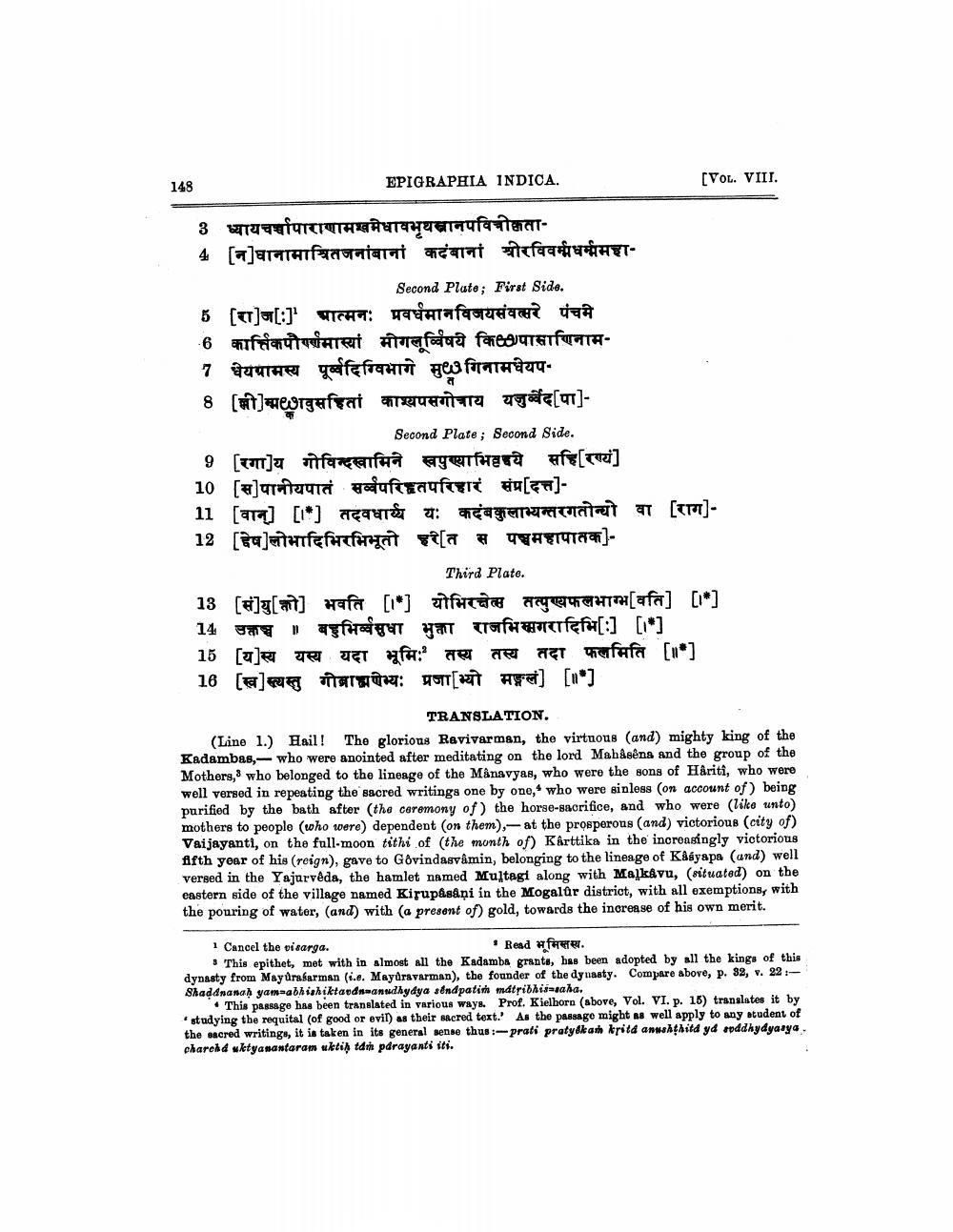________________
148
EPIGRAPHIA INDICA.
[VOL. VIII.
3 ध्यायचर्चापाराणामखमेधावभूथनानपवित्रीकता4 [न]घानामाश्रितजनांबानां कदंबानां श्रीरविवर्माधर्ममहा
Second Plate; First Side. । [राज[:] पात्मनः प्रवर्धमानविजयसंवत्सरे पंचमे 6 कार्तिकपौर्णमास्यां मोगलूविषये किलपासाणिनाम7 धेयग्रामस्य पूर्वदिग्विभागे मुगिनामधेयप8 [सी]म्मासहितां काश्यपसगोत्राय यजुर्वेद[पा]
Second Plate ; Second Side. 9 [रगाय गोविन्दवामिने स्वपुण्याभिवषये सहिरण्यं] 10 [स]पानीयपातं सर्वपरिहतपरिहारं संप्रदत्त]11 [वान्] [*] तदवधायं यः कदंबकुलाभ्यन्तरगतोन्यो वा [राग]12 [देष]लोभादिभिरभिभूतो हर[त स पञ्चमहापातक]
Third Plate. 18 [सं]यु[को] भवति [*] योभिरक्षेत्म सत्पुण्यफलभाग्भ[वति] [*] 14 उक्तञ्च ॥ बहुभिर्वसुधा भुक्ता राजभिमगरादिभि[:] [1] 16 [यस्य यस्य यदा भूमिः तस्य तस्य तदा फलमिति [*] 16 [व] त्यस्तु गोब्राह्मणेभ्यः प्रजा[भ्यो मङ्गलं] [*]
TRANSLATION. (Line 1.) Hail! Tho glorions Ravivarmen, the virtuous (and) mighty king of the Kadambas,- who were anointed after meditating on the lord Mah&gêna and the group of the Mothers, who belonged to the lineage of the Manavyas, who were the sons of Hariti, who were well versed in repeating the sacred writings one by one, who were sinless (on account of being purified by the bath after (the ceremony of) the horse-sacrifice, and who were (like tunto) mothers to people (who were) dependent (on them),-at the prosperous (and) victorious (city of) Vaijayanti, on the full-moon tithi of the month of) Kârttika in the increasingly victorious Afth year of his (reign), gave to Govindasvamin, belonging to the lineage of Kalyapa (und) well versed in the Yajurveda, the hamlet named Multagi along with Malkavu, (situated) on the eastern side of the village named Kirupasani in the Mogalur district, with all exemptions, with the pouring of water, (and) with (a present of gold, towards the increase of his own merit.
1 Cancel the visarga.
- Read भूमिस्तस्थ. This epithet, met with in almost all the Kadamba grants, has been adopted by all the kings of this dynasty from Mayurasarman (i... Maydråvarman), the founder of the dynasty. Compare above, p. 82, v. 22 - Shaddnanan yanmabhishiktardswanadhydya sendpati mdtridhisagaha.
• This passage has been translated in various ways. Prof. Kielhorn (above, Vol. VI. p. 15) tranalates it by studying the requital (of good or evil) as their sacred text. As the passage might as well apply to any student of the sacred writings, it is taken in its general sense thus :-prati pratysk as krita anushthitd yd opddhydyasya. chared sktya santaram uktin tdi paraganti iti.




